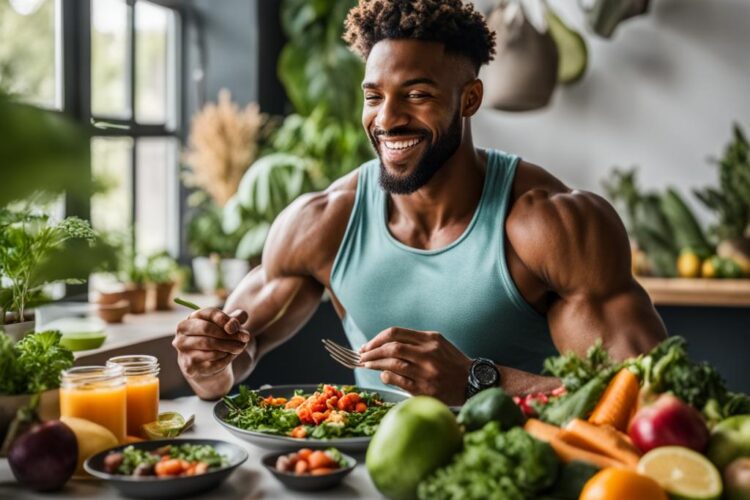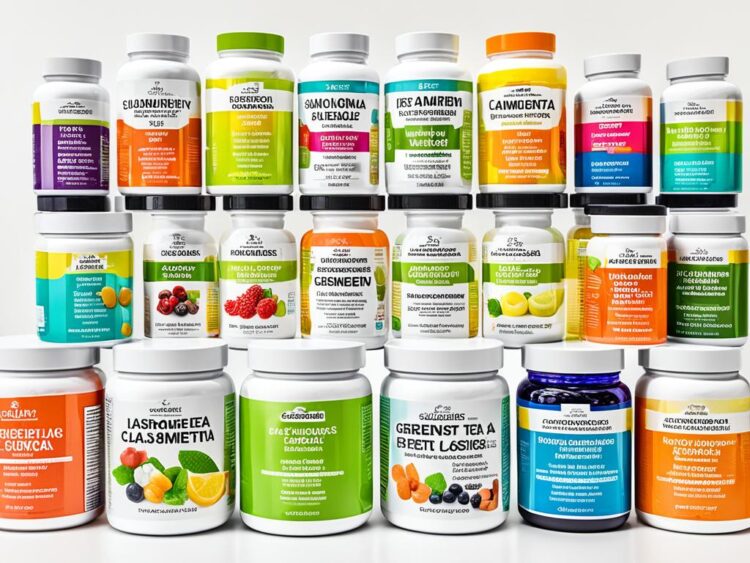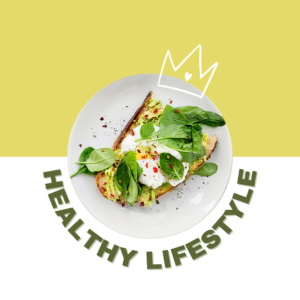As a fitness enthusiast committed to a plant-based lifestyle, I understand the importance of aligning my diet with my fitness goals. If you're wondering if it's possible to achieve optimal performance and strength gains on a vegan diet, the answer is a resounding yes! With careful attention to nutrition, you can maximize your workout plan while following a vegan fitness diet.
Key Takeaways:
- Adopting a vegan diet for fitness can improve overall health, prevent diseases, and reduce environmental impact.
- Properly planned vegan diets provide all necessary nutrients for athletes at all stages of life.
- Focus on consuming nutrient-dense whole foods, such as vegetables, fruits, whole grains, legumes, and nuts.
- Calorie intake plays a significant role in athletic performance and physique goals, so work with a nutrition professional to determine your appropriate calorie goal.
- Aim for balanced macronutrient ratios, adjusting them based on your specific lifestyle, training, and goals.
Now that we've covered the basics, let's dive deeper into the steps you can take to optimize your vegan fitness diet for strength training. By following these tips, you'll be well on your way to achieving your fitness goals without compromising your plant-based principles.
The Benefits of a Vegan Diet for Strength Training
When it comes to plant-based fitness and vegan nutrition for fitness, a vegan diet offers numerous advantages for strength training. According to the Academy of Nutrition and Dietetics, appropriately planned vegan diets can provide all the necessary nutrients for athletes at all stages of the life cycle, including pregnancy, lactation, and even for competitive athletes.
“A vegan diet can reduce the risk of certain health conditions, such as heart disease, type 2 diabetes, hypertension, certain types of cancer, and obesity.”
Aside from improving overall health and reducing the risk of chronic diseases, plant-based diets are also more environmentally sustainable compared to diets rich in animal products. By adopting a vegan fitness diet, not only will you optimize your workout plan, but you'll also contribute to a healthier planet.
| Benefits of a Vegan Diet for Strength Training |
|---|
| 1. Reduced risk of heart disease |
| 2. Lower risk of type 2 diabetes |
| 3. Decreased likelihood of hypertension |
| 4. Mitigated risk of certain types of cancer |
| 5. Effective weight management for obesity prevention |
| 6. Sustainable and eco-friendly dietary choice |
Embracing a vegan diet for strength training not only supports your fitness goals but also aligns with your ethical values. By harnessing the power of plant-based nutrition, you can achieve optimal health, challenge your physical limits, and make a positive impact on both your body and the planet.
Step 1: Nutrition Quality
To optimize your vegan fitness journey, it's crucial to focus on the quality of your nutrition. By choosing nutrient-dense foods, you can ensure that your body receives the essential nutrients it needs for optimal performance and overall health.
When selecting foods for your vegan diet, prioritize whole, natural options that are minimally processed. These foods are rich in vitamins, minerals, and antioxidants, providing numerous health benefits.
Here are some examples of nutrient-dense foods that should be a staple in your vegan diet:
| Food Group | Examples |
|---|---|
| Vegetables | Kale, spinach, broccoli, bell peppers |
| Fruits | Blueberries, strawberries, oranges, bananas |
| Whole Grains | Brown rice, quinoa, oats, whole wheat bread |
| Legumes | Black beans, lentils, chickpeas, tofu |
| Nuts and Seeds | Almonds, walnuts, chia seeds, flaxseeds |
By incorporating these nutrient-dense foods into your meals, you provide your body with a wide range of vitamins, minerals, and fiber. These nutrients support your immune system, promote muscle recovery and growth, and contribute to overall well-being.
“Nutrient-dense foods are the foundation of a healthy vegan diet, providing the fuel your body needs to thrive and support your fitness goals.”
When preparing your meals, it's best to opt for homemade dishes using fresh, whole ingredients. This way, you have full control over the quality of your meals and can avoid processed and fried foods that may be high in unhealthy fats, sodium, and added sugars.
Remember, the key to success in vegan nutrition is to make mindful choices that prioritize nutrient density. By selecting whole, plant-based foods, you nourish your body with the vital fuel it needs to excel in your fitness journey.
References:
- Craig, W. J., & Mangels, A. R. (2009). Position of the American Dietetic Association: vegetarian diets. Journal of the American Dietetic Association, 109(7), 1266-1282.
- Pribis, P. (2019). Effects of plant-based diets on plasma lipids. The American Journal of Cardiology, 125(8), 1263-1264.
- Tuso, P. J., Ismail, M. H., Ha, B. P., & Bartolotto, C. (2013). Nutritional update for physicians: plant-based diets. The Permanente Journal, 17(2), 61-66.
Step 2: Calories
Calorie intake is a crucial factor in optimizing athletic performance and achieving your physique goals on a vegan diet. While tracking calories may not be 100% accurate, it can provide a helpful estimate of your energy intake. Working with a nutrition professional will help determine your specific calorie goal based on your fitness endeavors and physique goals.
It's important to note that vegan food sources may have different calorie densities compared to animal-based foods. This means you may need to make adjustments to ensure you're consuming an appropriate amount of calories.
By monitoring your calorie intake and making necessary adjustments, you can fuel your body effectively to support your fitness journey.
Why Track Calories?
Tracking your calorie intake allows you to have a better understanding of how much energy you're consuming and helps you maintain an appropriate balance for your goals. It provides valuable insight into your nutrition, helping you make informed decisions about your diet.
Here are a few reasons why tracking calories can be beneficial:
- Allows you to assess your energy needs and make adjustments accordingly.
- Helps you monitor portion sizes and ensure you're meeting your nutritional requirements.
- Enables you to identify patterns in your eating habits and make necessary changes for better results.
- Gives you a sense of control over your nutrition and empowers you to make mindful choices.
Remember, calorie tracking is a tool to guide you, but it's important to prioritize overall nutrition quality and listen to your body's needs.
Consulting a Nutrition Professional
Working with a nutrition professional who specializes in vegan diets can provide personalized guidance on determining your calorie goal. They will consider factors such as your activity level, body composition goals, and specific dietary needs.
Together, you can create a plan that ensures you're consuming enough calories to fuel your workouts, support recovery, and achieve your desired fitness outcomes.
Sample Calorie Tracking Table
| Food Item | Serving Size | Calories |
|---|---|---|
| Quinoa | 1 cup cooked | 222 |
| Chickpeas | 1 cup cooked | 269 |
| Avocado | 1 medium | 234 |
| Almonds | 1 ounce | 164 |
| Tofu | 3 ounces | 144 |
Note: The calorie content may vary depending on the brand and preparation method. Always check the labels and make adjustments accordingly.
Step 3: Macronutrients
After addressing nutrition quality and calories, it's time to focus on macronutrients. These are the essential nutrients our bodies require in larger quantities: carbohydrates, fats, and protein. As a vegan, it's important to ensure you're getting the right ratios of these macronutrients to support your fitness goals.
To optimize your vegan diet, aim to get 50% of your daily calorie intake from carbohydrates, 25-30% from fats, and 20-25% from protein. This balance will provide your body with the energy and nutrients it needs to perform at its best.
Differing lifestyles, training regimens, and goals may require adjustments to these ratios:
- Endurance athletes: If you're an endurance athlete, you may need to increase your carbohydrate intake to fuel your long-duration activities. Aim for 55-60% of your daily calories to come from carbohydrates. This will provide sustained energy and help prevent fatigue during lengthy workouts or competitions.
- Competitive strength athletes: For competitive strength athletes, a higher protein intake may be necessary to support muscle growth and recovery. Increase your protein intake to 25-30% of your daily calories. This extra protein will assist in repairing and building muscle tissue, helping you reach new levels of strength and performance.
When it comes to vegan protein sources, there are plenty of options to choose from. Incorporate legumes, such as lentils, chickpeas, and black beans, into your meals. Tofu, tempeh, and edamame are also excellent plant-based protein sources. Additionally, consider adding plant-based protein powders to your diet for a convenient and concentrated protein boost.
| Vegan Protein Sources | Protein Content (per 100g) |
|---|---|
| Lentils | 9g |
| Chickpeas | 19g |
| Black Beans | 21g |
| Tofu | 8g |
| Tempeh | 19g |
| Edamame | 11g |
Remember, these macronutrient ratios and protein sources are not set in stone. Adjust them based on your individual needs, activity levels, and specific fitness goals. Consider consulting with a nutrition professional who can provide personalized guidance to help you optimize your vegan diet for strength training.
Step 4: Pre- and Post-Workout Nutrition
When it comes to your vegan fitness journey, it's important to consider the role of pre- and post-workout nutrition. While these practices are essential for athletes, they may not require significant changes for most strength trainees on a vegan diet. Let's take a closer look at how you can optimize your pre- and post-workout nutrition as a vegan.
Pre-Workout Nutrition
For longer workouts or endurance athletes, it's crucial to fuel your body with the right nutrients before exercise. Focus on consuming slow-digesting carbohydrates and moderate protein to provide sustained energy throughout your workout. Opt for sources like whole grains, sweet potatoes, and legumes to ensure a steady release of energy. Additionally, including a moderate amount of protein from sources like tofu, tempeh, or plant-based protein powders can support muscle maintenance and repair during exercise.
Post-Workout Nutrition
After your workout, your body needs quick replenishment of nutrients to kickstart the recovery process. Fast-digesting carbohydrates are essential to replenish glycogen stores, while a higher protein intake aids in muscle repair and growth. Incorporate foods like fruits, smoothies, or whole grain bread for readily available carbohydrates, and consider increasing your protein intake from sources like lentils, quinoa, or vegan protein powder. By choosing protein sources with high bioavailability, you can ensure that your body receives the necessary amino acids for optimal muscle recovery.
Remember that individual needs may vary based on factors like workout intensity, duration, and overall fitness goals. Consulting with a registered dietitian who specializes in vegan nutrition can provide personalized guidance to help you optimize your pre- and post-workout nutrition.
| Pre-Workout Nutrition | Post-Workout Nutrition |
|---|---|
| Slow-digesting carbohydrates | Fast-digesting carbohydrates |
| Moderate protein | Higher protein intake |
| Examples: whole grains, sweet potatoes, legumes | Examples: fruits, smoothies, whole grain bread, lentils, quinoa |
Step 5: Supplements
Although supplements are not a replacement for a well-rounded vegan diet, they can serve as insurance for optimal nutrition. It's essential to understand which supplements are beneficial for vegan fitness enthusiasts.
The first non-negotiable vegan supplement is vitamin B12. This essential nutrient is primarily found in animal-based foods, making it challenging for vegans to obtain adequate amounts solely from plant sources. Vitamin B12 is crucial for energy production, nervous system function, and red blood cell formation.
“Vitamin B12 deficiency can lead to fatigue, weakness, and even irreversible neurological damage,” warns Dr. Jane Davis, a registered dietitian specializing in plant-based nutrition. “To ensure sufficient intake, I highly recommend taking a vitamin B12 supplement or consuming fortified foods.”
In addition to vitamin B12, there are other supplements that may be beneficial for vegan strength athletes. One such supplement is vegan protein powder. Protein is essential for muscle building and recovery, and vegan protein powders offer a convenient way to meet your protein needs without relying solely on whole foods.
Another supplement that may enhance exercise performance and aid in muscle rebuilding is creatine. Creatine is naturally found in animal products but can also be derived from plant-based sources. It has been extensively studied and shown to be safe and effective for improving strength and power output during high-intensity workouts.
Remember, supplements should complement a well-rounded vegan diet and should be used in consultation with a healthcare professional or registered dietitian to ensure personalized advice and appropriate dosage.
| Supplement | Benefits |
|---|---|
| Vitamin B12 | Aids energy production, supports nervous system function, and promotes red blood cell formation. |
| Vegan Protein Powder | Offers a convenient source of protein for muscle building and recovery. |
| Creatine | Enhances exercise performance and aids in muscle rebuilding. |
Conclusion
Choosing a vegan fitness diet is not only beneficial for your health and the planet but also supports your workout plan and helps you achieve your fitness goals. By focusing on key aspects like nutrition quality, calorie intake, macronutrient ratios, pre- and post-workout nutrition, and supplements, you can optimize your vegan diet for strength training and maximize your performance.
However, it's important to remember that individual needs may vary, so consulting with a nutrition professional is highly recommended. They can provide personalized guidance and help you create a well-rounded meal plan that aligns with your specific fitness endeavors.
With the right approach and commitment, you can thrive on a vegan bodybuilding diet and achieve peak performance while staying true to your ethical principles. So start planning your nutritious and delicious vegan meal plan today and take your fitness journey to new heights!
FAQ
Can a vegan diet provide enough nutrients for strength training?
Yes, appropriately planned vegan diets can provide all the necessary nutrients for athletes, including those involved in strength training.
What are the benefits of a vegan diet for strength training?
A vegan diet reduces the risk of certain health conditions, improves overall health, and is more environmentally sustainable.
How can I ensure nutrition quality on a vegan diet?
Focus on consuming whole, natural foods that are nutrient-dense, such as vegetables, fruits, whole grains, legumes, and nuts.
Do I need to track my calorie intake on a vegan diet for fitness?
While not necessary for everyone, tracking calorie intake can provide an estimate of energy intake and help with achieving fitness goals.
What are the recommended macronutrient ratios for a vegan fitness diet?
Aim to get 50% of your calories from carbohydrates, 25-30% from fats, and 20-25% from protein.
What are some vegan protein sources for strength training?
Vegan protein sources include legumes, tofu, tempeh, and plant-based protein powders.
Should I adjust my nutrition around workouts on a vegan diet?
For most strength trainees, adjusting nutrition patterns around workouts may not be necessary, but longer workouts or endurance athletes may benefit from consuming specific carbohydrates and protein before and after exercise.
Are supplements necessary for a vegan fitness diet?
The only non-negotiable supplement for vegans is vitamin B12. Additional supplements like protein powder and creatine may be beneficial for some strength athletes but are not necessary for everyone.
Can I thrive on a vegan fitness diet?
Yes, following a well-rounded vegan fitness diet can support your workout plan and help you achieve your fitness goals while adhering to your ethical principles.





